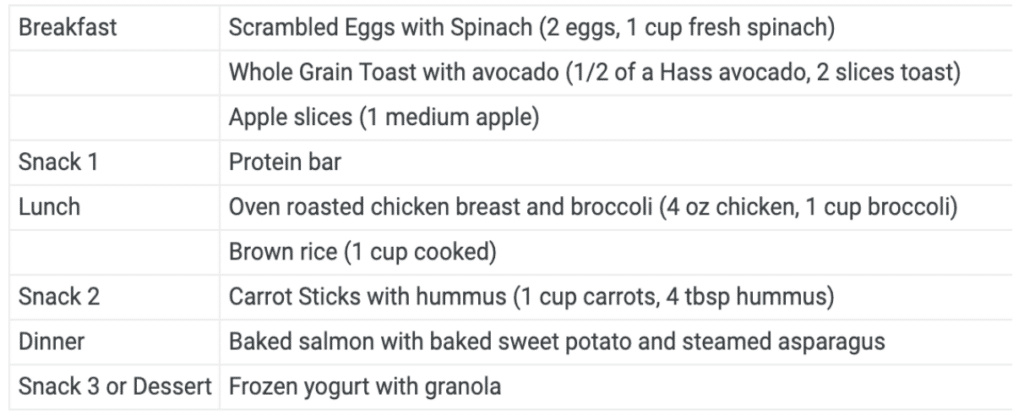Have you ever wondered about the role nutrition plays when it comes to your muscle building and toning?
Building muscle and achieving a toned physique isn’t just about hitting the gym and lifting heavy weights. Although strength training is key to muscle building and toning, your diet is equally important. Think of it as fueling your body for success. Fueling your body for success starts with getting in enough calories and the right balance of calories throughout the day. Read on to learn about macronutrient estimates that support muscle building and general health.
Protein and building muscle
Protein is the foundation of muscle growth. When you work out, you create tiny tears in your muscle fibers. Protein swoops in like a superhero to repair and rebuild those fibers, making them bigger and stronger. Most people should eat between 10-35 percent of their daily calories from protein. For example, if you eat 2000 calories daily, around 50-175 grams would come from protein. If you are an active person or athlete with muscle-building goals, your needs will likely be on the higher end of this range. Remember that the amount of protein needed can vary based on your body weight, activity level, health, and personal goals. Aim for protein sources like lean meats, chicken, turkey, eggs, fish, beans, lentils, or tofu.
Carbohydrates and building muscle
Next up, let’s talk about carbohydrates, commonly referred to as carbs. Carbs are the most misunderstood, but they are the breadwinner (no pun intended) when it comes to providing your body with energy. Carbs fuel your workouts and help you push through those tough sets. Steer clear of extremely low-carb diets, which can actually result in breaking muscle down. Most people should eat between 45-65 percent of their daily calories from carbs.
For example, if you eat 2000 calories daily, around 225-325 grams would come from carbs. If you are active or training at a high intensity or long duration, you would likely be on the higher end of this range. Please note the precise amount of carbs needed can vary based on age, gender, health, activity level, and personal goals.
Opt for higher quality, “complex” carbs (like sweet potatoes, oats, brown rice, whole grain bread, quinoa, beans, and vegetables) most of the time. Complex carbs have more fiber and nutrients, take longer to digest, give you more sustained or constant energy, and allow you to feel fuller longer. On the other hand, simple carbs are digested quicker, don’t provide energy for an extended period of time, and don’t keep you full as long. Choose simple carbs (like soda, candy, fruit juice, white bread, etc.) in moderation.
Fat and building muscle
We know that carbs largely power you through workouts, but fat also powers certain types of physical activity. Even though protein typically gets most of the glory, fat plays a role in muscle building. Fat is essential for absorbing vitamins and producing hormones necessary for muscle growth. Focus on heart-healthy fats like avocados, nuts, and olive oil. As with everything, moderation is key. Fat should generally comprise between 20-35 percent of total daily calories. For example, if you eat 2000 calories per day, around 44-78 grams would come from fat.
Hydration and building muscle
Water is often overlooked but vital for muscle function and recovery. Aim for at least eight glasses daily or more if you’re active. Proper hydration helps transport nutrients to your muscles and flush out waste products. Aim to head into workouts hydrated by sipping on water throughout the day to maximize your workout. Follow up with hydration after workouts to recover and be ready for the next workout.
Fuel for realistic results
Remember that your diet and nutrition are the unsung heroes of muscle-building and toning. Without the right fuel, your workouts won’t yield the results you desire. So, eat well, stay hydrated, and watch your body transform. If it doesn’t happen overnight, you are doing something right! Stay consistent with your strength training and continue to fuel your body for success. Depending on your unique situation, you can expect to start seeing results after a few weeks to several months. Remember, results and progress can be so much more than just changes in your body. Pay attention to other forms of progress important to you – like how you feel in your body, your ability to lift heavier weights with more ease, your energy throughout the day, your overall health, or how your training/nutrition regimen impacts your emotional well-being.
Wondering how to put it all together?
Check out this sample eating plan for muscle building:

This sample 1-day eating plan outlines a 2000-calorie diet made up of 24% protein (132 grams), 44% carbohydrates (225 grams), and 32% fat (72 grams). This is an example of what nutrition for muscle building could look like. Remember that individual nutritional needs vary based on several factors, and this sample eating plan may not suit you.
For a customized plan, consult with a registered dietitian or healthcare professional to consider specific lifestyle factors and individual health goals.
